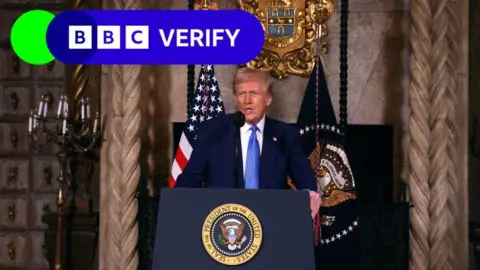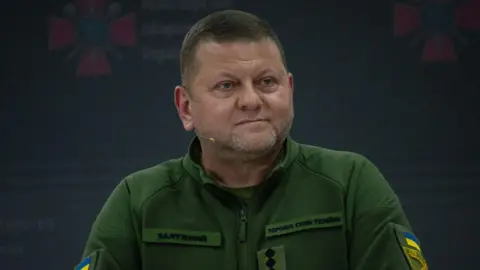BBC Verify
 Getty Images
Getty ImagesUS President Donald Trump has appeared to accuse Ukraine of being responsible for the war with Russia, in a flurry of claims from his Mar-a-Lago mansion in Florida.
Speaking to reporters, Trump also made claims about President Volodymyr Zelensky’s popularity and observed that Ukraine had yet to hold scheduled elections due to martial law. He later doubled down on those comments in a fiery Truth Social post on Wednesday.
Trump’s accusations – some of which appeared to mirror common Russian talking points about the war – came just hours after US officials met a Russian delegation in Riyadh to open talks to end the conflict, which has raged for almost three years.
Zelensky later accused Trump of “living in a disinformation space” created by Russia.
BBC Verify has fact-checked Trump’s claims.
Claim: Zelensky is a ‘dictator without elections’
Trump initially drew attention to the fact that Ukraine has not held a presidential election since 2019, when Zelensky – previously a comedian with no political base – swept to power.
He repeated the claims in a Truth Social post in which he accused the Ukrainian leader of being a “dictator without elections”.
Zelensky’s first five-year term of office was due to come to an end in May 2024. However, Ukraine has been under martial law since the Russian invasion in February 2022, which means elections are suspended.
Ukraine’s martial laws were drafted in 2015 – shortly after Russia annexed the Crimean Peninsula and years before Zelensky and his Servant of the People party came to power.
Independent observers from the OSCE said the 2019 election had been “competitive and fundamental freedoms were generally respected”.
Zelensky won 73% of the vote in the second-round run-off.
Zelensky has vowed to hold a new election once the conflict ends and has yet to confirm that he intends to stand. Some experts have observed that holding elections in Ukraine before the conflict ends would be practically impossible, as Russian attacks on many cities persist and millions of citizens are displaced abroad or living under Russian occupation.
Trump’s intervention on the subject came just hours after the Kremlin questioned Zelensky’s legitimacy as his term in office has ended, a claim Moscow has repeatedly made in the past months. On 28 January, Russia’s President Vladimir Putin called Zelensky “illegitimate” in an interview with Russian media.
Referring to the electoral situation, Trump appeared aware that it had been a frequent Russian allegation used to undermine Zelensky, saying in his news conference: “That’s not a Russian thing, that’s something coming from me, from other countries.”
For his part, Zelensky has previously said it would be “absolutely irresponsible to throw the topic of elections” in the middle of the conflict.
Claim: ‘I hate to say it, but he’s down at 4% approval rating’
President Trump also claimed that Zelensky’s approval rating has fallen to 4%.
It’s unclear what source the president was citing as he didn’t provide evidence. We have asked the White House to clarify this.
Official polling is limited and it is extremely difficult to carry out accurate surveys during a time of war. Millions of Ukrainians have fled and Russia has occupied around a fifth of the country.
However, some polling has been possible to carry out by telephone. A survey conducted this month found that 57% of Ukrainians said they trusted the president, according to the Ukraine-based Kyiv International Institute of Sociology.
However, that was down from 77% at the end of 2023, and 90% in May 2022 – suggesting that the president has suffered a drop-off in his popularity.
Some other polls suggest Zelensky trailing his nearest rival, former army chief Valerii Zaluzhnyi, in the first round of any future election, indicating the two would face each other in a run-off.
 Getty Images
Getty ImagesIn the wake of Trump’s comments, some major Russian media outlets seized on the claim and cited a poll carried out by Ukrainian MP and Zelensky critic, Oleksandr Dubinsky, on Telegram which they claimed backed up Trump’s assessment.
Dubinsky has been charged with treason in Ukraine, and accused of “operating at the behest of Russian intelligence” – which he denies.
Claim: ‘You should have never started it’
Ukrainian authorities expressed dissatisfaction over not being part of Tuesday’s talks in Riyadh. But Trump dismissed these concerns, telling reporters that Ukraine had had three years to end the war, before appearing to blame Kyiv for starting the conflict.
“You should have never started it,” he said. The Kremlin has previously accused Ukraine of starting the war against Russia.
“It was they who started the war in 2014. Our goal is to stop this war. And we did not start this war in 2022,” Russian President Vladimir Putin told US talk show host Tucker Carlson in February 2024.
Ukraine didn’t start the war. Russia launched a full-scale invasion of Ukraine in February 2022, having annexed Crimea in 2014.
The annexation came after Ukraine’s pro-Russian president was ousted by popular demonstrations.
Russia also backed proxy forces who seized areas of eastern Ukraine, and it accused the new government in Kyiv of discrimination and genocide against Russian speakers. The International Court of Justice has rejected Moscow’s claims.
After the failure of agreements which aimed to end the post-2014 conflict – Russia began a massive build-up of troops on its border with Ukraine in late 2021.
Putin launched the invasion on 24 February 2022, stating that the aim of the operation was to “demilitarise and denazify” the pro-Western government of Volodymyr Zelensky and prevent the country from joining Nato.
In Ukraine’s last parliamentary elections, support for far-right candidates was 2%. It should also be noted that Zelensky is Jewish and that his party has been regarded as centrist.
And while Nato officials said in 2021 that Ukraine was a candidate to join the Western alliance in the future, it was not part of any formal process.
Additional reporting by BBC Monitoring.



